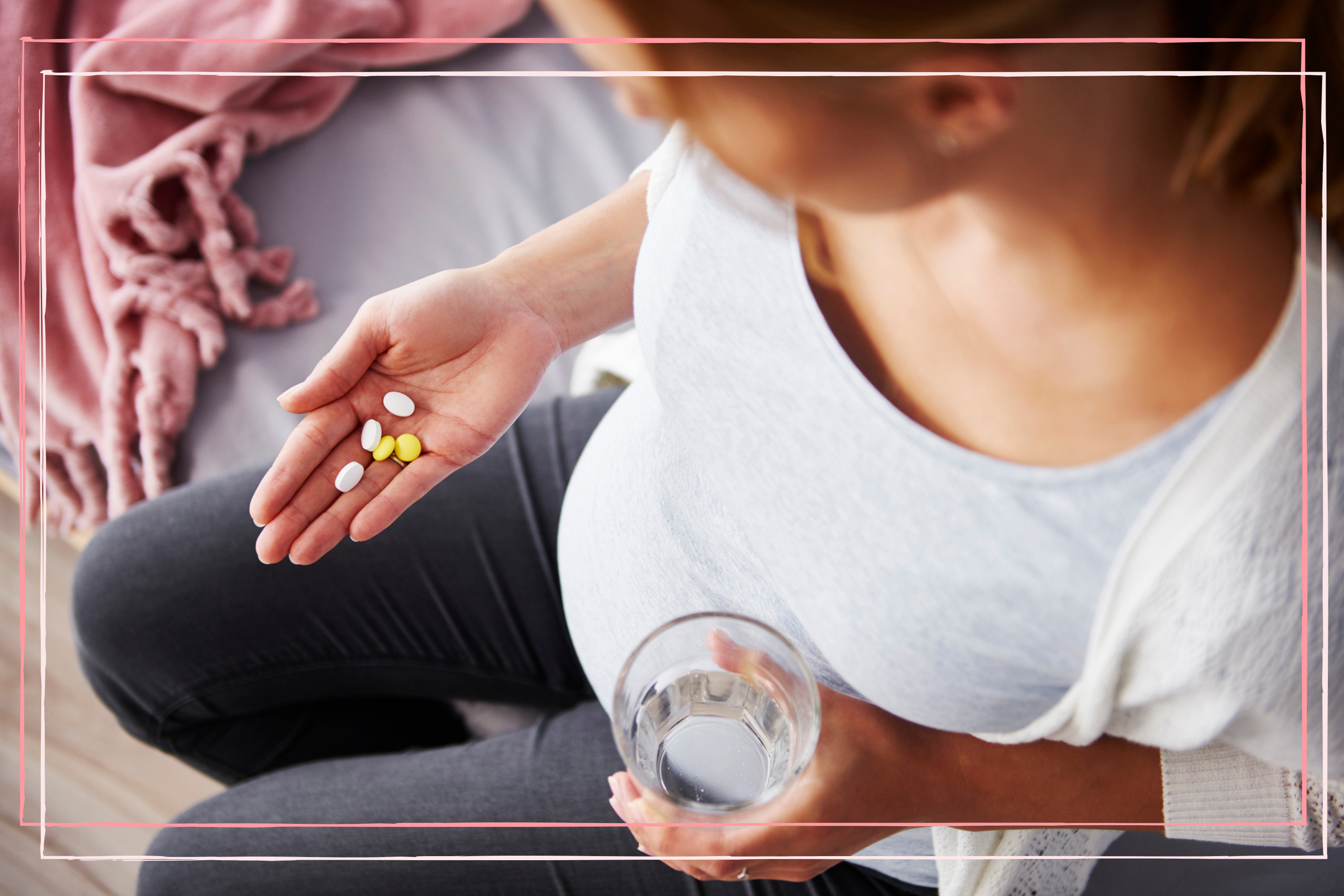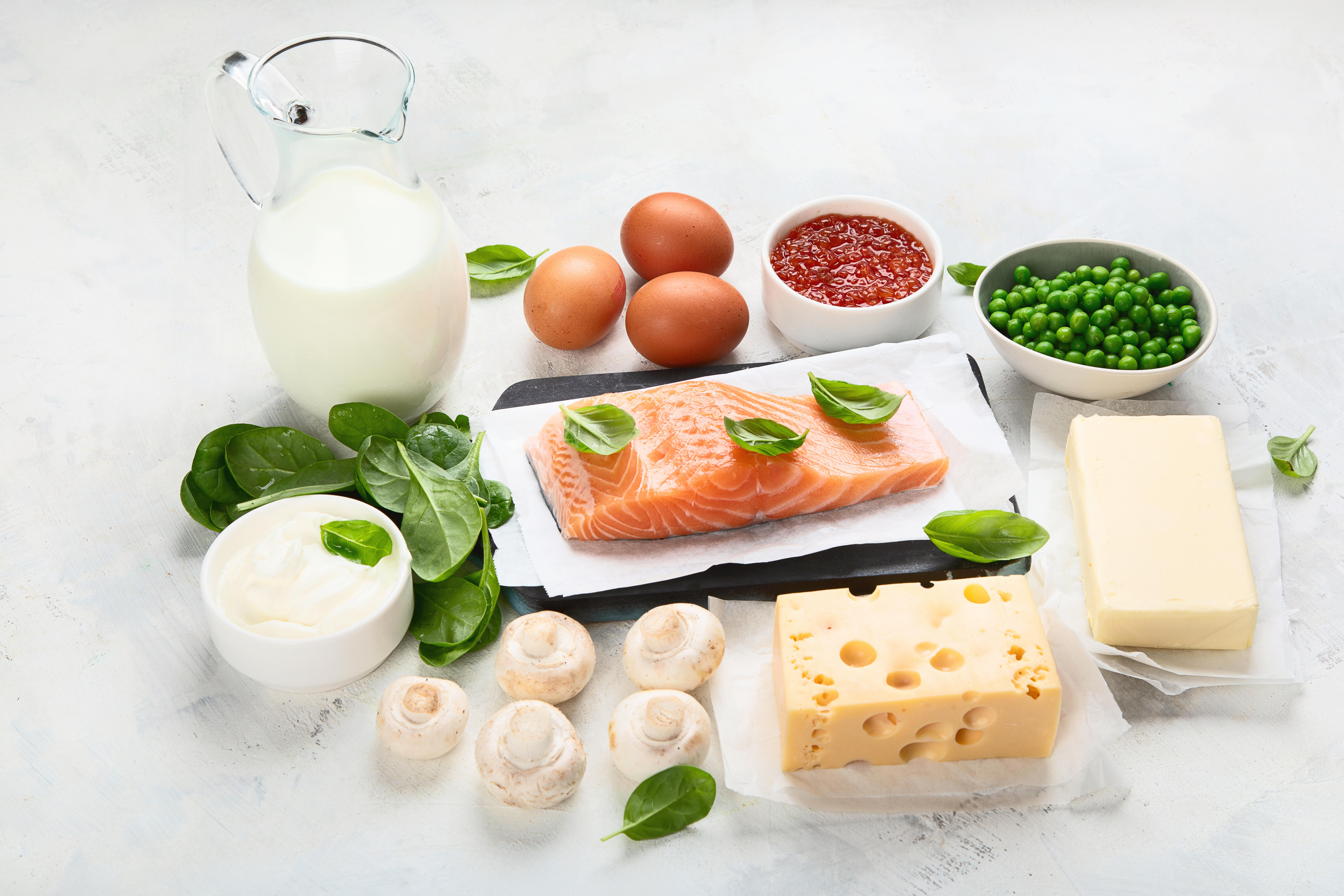
Parenting advice, hot topics, best buys and family finance tips delivered straight to your inbox.
You are now subscribed
Your newsletter sign-up was successful
Whether you’ve been taking folic acid for months before conceiving, or your pregnancy was unplanned, as soon as you see those positive lines on a test you’ll need to make some changes to your diet straight away.
We know that drinking alcohol in pregnancy can cause foetal alcohol syndrome but the effect of drinking even small amounts is not known. Therefore, it’s recommended that pregnant women avoid it entirely, just to be safe. Caffeine should be kept to 200mg a day - or two or three cups of coffee because too much caffeine can lead to your baby having a low birth weight.
These are a couple of examples of things you’ll need to cut out, or cut down on, but what about the vitamins or foods you’ll need more of during the nine months?
When you’re pregnant your baby is reliant on you for all of the nutrients it needs to grow and develop and it’s important you stay healthy too. Nutritionist Lucy Upton says: “Women's nutritional needs increase during pregnancy to support the numerous changes in their bodies, such as increased blood volume and tissue growth, as well as the healthy development of the growing baby.
“Maternal nutrition significantly impacts the baby’s development, particularly during pregnancy, which falls within the first 1,000 days - a critical period for laying the foundation for lifelong health. Proper nutrition during this time can influence the baby’s growth, immune system, brain and cognitive development, and long-term health outcomes,” she adds.
Luckily, there are lots of foods we can eat which will provide these essential vitamins and nutrients. There are also prenatal products on the market to suit all budgets and if you’re entitled to the government’s Healthy Start card you will be given prenatal vitamins for free.
5 vitamins and supplements recommended in pregnancy
While we will seek to give an unbiased and accurate description of the benefits of each of these vitamins and supplements, it’s also important to speak to your GP or midwife if you have any questions.
Parenting advice, hot topics, best buys and family finance tips delivered straight to your inbox.
1. Folic Acid
Folic acid is the supplement that will probably be mentioned most when you find out you’re pregnant. Many women start taking it when they’re trying to conceive but it’s also important to continue taking 400 micrograms every day until you are 12 weeks pregnant. If your pregnancy was unplanned, you should start taking folic acid straight away.
The reason folic acid is so important is because it helps prevent neural tube defects in your baby which can cause life-limiting conditions like spina bifida. Some foods such as green leafy vegetables and breakfast cereals contain folate but doctors will still recommend taking the supplement to make sure your body is getting the required amount.
2. Vitamin D
It’s recommended that adults and children living in the UK take a vitamin D supplement from September to March when our bodies can’t make enough from sunlight alone. This also applies to pregnant and breastfeeding women. The recommended daily dose for all adults is 10 micrograms.
Vitamin D is important for calcium absorption and for keeping our bones, teeth and muscles healthy but is only found in a small number of foods which is why nutrition experts recommend a daily supplement. If you want to make sure you’re including vitamin D in your diet, make sure to eat plenty of oily fish, eggs and red meat and look out for fortified breakfast cereals.
Pregnancy nutrition expert Hayley Pedrick emphasises the importance of understanding your vitamin D levels to appropriately supplement for the healthy development of your baby's bones, heart, and immune system. This is particularly crucial during the winter months in the UK, where sunlight exposure is insufficient to maintain adequate vitamin D levels. A quality supplement should provide a minimum of 400 IU/day, but if your levels are found to be deficient, you may require a higher dosage.

3. Iron
Iron is important in pregnancy because your body is pumping more blood than usual and this blood needs to take oxygen to your baby. Iron helps with this and insufficient levels of it can lead to anaemia which might affect your baby’s birth weight or lead to a pre-term birth.
Iron is something you can definitely get from the food you eat so try to include lots of green leafy vegetables such as spinach and kale, lean meats, dried fruit and nuts. If you’re feeling tired and suspect your iron levels are running low, your GP or midwife may advise you to take some iron supplements. These are safe to take but can lead to side effects such as constipation and piles.
4. DHA
DHA is found in oily fish such as salmon, mackerel, trout and sardines but it can be hard to get the amount you need just from food.
Nutritionists recommend 200 micrograms per day of DHA and some prenatal supplement brands, such as Pregnacare Max, have omega-3 tablets included, alongside the ones containing all of the recommended vitamins.
Upton says: “It is important not to turn to cod liver oil as a source of these fatty acids as often the Vitamin A content is too high, and instead look for a specific omega-3 supplement, especially if a mother is not consuming key dietary sources such as oily fish. If a mother is vegetarian or vegan, an algae-based (rather than fish-based) omega-3 supplement is a good option.”
5. Calcium
You need to make sure you’re consuming plenty of calcium when you’re pregnant because it’s needed to make your baby’s bones and teeth. Even if you are vegetarian or vegan you should still be able to eat a variety of foods which contain calcium. These include:
- Milk, cheese and yoghurt
- Green leafy vegetables
- Tofu
- Bread and any foods made with fortified flour
- Fish where you eat the bones such as sardines, whitebait or pilchards
- Soya alternatives, with calcium added
Upton recommends an extra 300mg of calcium per day (equivalent to around 250ml glass of milk).
Other beneficial vitamins and supplements for pregnancy
This 2017 study found that magnesium is a nutrient which can play an important role in ensuring a healthy pregnancy. It found that a dose of 300mg per day can prevent preterm birth, low birth weight and lower the risk of pre-eclampsia.
Magnesium is found in many multivitamins and also in green leafy vegetables, nuts and seeds and wholegrains.
Pregnancy can be really tiring for some women and you will want to keep your immune system healthy to avoid any illnesses which are doing the rounds and will make you feel even more wiped out. Vitamin C is important for protecting your cells and keeping them healthy. Many fruits and vegetables such as oranges, peppers, strawberries and broccoli contain vitamin C. Adding foods which contain vitamin C to your meals can also help with the absorption of iron which is obviously also important during pregnancy.
Upton says choline is an often overlooked nutrient but one which is worth being aware of during pregnancy. She explains: “It works alongside folate early in pregnancy to support a baby’s brain and neural tube development. Great sources of choline include eggs (particularly the yolk), lean meats like chicken and beef, fish, dairy products, and some beans and legumes.”
Around 450mg of choline is recommended per day but Upton says women who are vegan may want to consider supplements if they can’t get it via food.
Nutritionist Michaella Mazzoni says women might want to add a probiotic into their daily supplement intake too. Probiotics are the ‘good’ live bacteria and yeasts which can help keep your gut healthy and are often found in yoghurts or supplements. She says they can “support the vaginal microbiome, immune function and morning sickness”. Optibac and many other supplement brands have probiotics which are safe to take during pregnancy.
How to choose pregnancy vitamins and supplements
We have outlined some ways above that you can incorporate these vitamins and nutrients into your diet when you’re pregnant. But Upton says: “If a food-first approach is feasible for a mother to make dietary adjustments to help ensure enough of some of the nutrients I’ve mentioned above e.g. adding in an extra portion of dairy for calcium and iodine, prioritising iron and protein-rich foods at every meal, then just taking a vitamin D and folic acid supplement can be enough.
“For other women who want the reassurance and convenience of a multivitamin, and/or have a more restricted diet or are struggling with eating during their pregnancy due to symptoms such as nausea, a multivitamin may be a better choice.”
It’s recommended that you take these tablets with meals as it will help with the absorption of the vitamins.
Mazzoni says it’s worth doing some research before choosing a multivitamin. She says: “I like Nutri Advanced’s Pregnancy Multi the most. It has vitamins which are more ‘bio available’ meaning they are more easily converted or used (by the body) than others.”
Brands recommended by Upton include Vitabiotics Pregnacare, Boots Pregnancy Multivitamin and Rhitrition Pregnancy Multivitamin. She adds that “many major supermarkets and pharmacies also sell pregnancy multivitamins (or combinations of essentials like vitamin D and folic acid), which contain the key nutrients of consideration and are much cheaper. It’s so important that mothers don’t feel priced out of the supplementation they need”.
Frequently asked questions
WhaWhat’s the issue with vitamin A (also known as retinol) in pregnancy?
“Vitamin A is an essential nutrient during pregnancy, playing a crucial role in the development of your baby’s organs, eyes, and immune system. However, it’s important to be cautious about the amount and form of vitamin A you’re taking, as getting too much can be harmful,’ says Pedrick.
Upton explains that too much vitamin A can lead to “serious birth defects such as issues with the spine, eyes, ears, face and internal organs”. This is why foods such as liver and pâté should be avoided during pregnancy as they contain a lot of vitamin A. Most people can get all of the vitamin A they need through their diet as it’s found in cheese, eggs, milk, oily fish and some fruits and vegetables (in the form of beta-carotene which the body converts to retinol).
Pedrick says many prenatal vitamins are formulated to include safe levels of vitamin A, “often in the form of beta-carotene, which is a plant-based precursor to vitamin A and is considered safe because your body only converts what it needs into the active form.”
However, it’s best to avoid taking any other vitamin A supplements and, as always, speak to your GP if you have any concerns.
Are there any other vitamins and supplements you should avoid in pregnancy?
Pedrick says you should also limit your vitamin E intake during pregnancy: “Although vitamin E is important for immune function and skin health, high doses have been associated with an increased risk of complications, including premature rupture of the amniotic sac. Like vitamin A, it’s usually best to get vitamin E from food sources and a prenatal vitamin, rather than high-dose supplements.”
How long should you take folic acid for?
“Ideally, women should start taking folic acid when trying to conceive, ideally for the first three months before and during the first 12 weeks (first trimester) of pregnancy. A dose of 400 micrograms is recommended daily,” says Upton. This is because the neural tube closes by the 12th week.
Is it better to take vitamins separately or is a multivitamin ok?
Pedrick says this will be dependent on the individual and their circumstances. “Both approaches have their benefits, and the best choice often depends on your specific health goals, dietary habits, and any recommendations from your healthcare provider,” she explains.
Mazzoni says taking a good quality multivitamin will stop you taking too much of something but may not include other nutrients you need such as omega-3, magnesium and probiotics so you might want to take these separately. Pedrick adds that: “There’s also the consideration of absorption and interactions. Some vitamins and minerals are better absorbed when taken separately or at different times of the day. For instance, calcium and
iron can compete for absorption, so taking them at different times can be more effective if you need both.”
“I always say the best supplements are those you remember to take every day, so choosing options that are easy to take e.g. one or two tablets, or sprays etc can be helpful for some mothers,” adds Upton.
If you have any questions about staying healthy during your pregnancy, speak to your GP or midwife who will be able to give you up-to-date advice.

Kat has been a digital journalist for over 15 years after starting her career at Sky News where she covered everything from terror attacks to royal babies and celebrity deaths. She has been working freelance for the last five years and regularly contributes to UK publications including Stylist, ES Best, Woman&Home, Metro and more.
